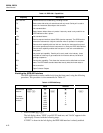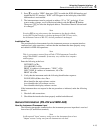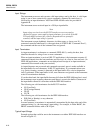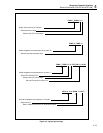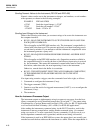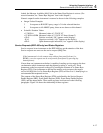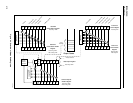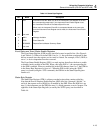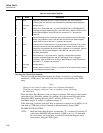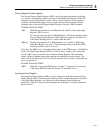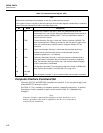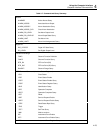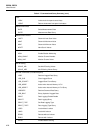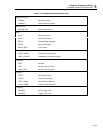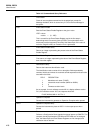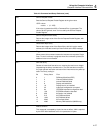
2620A, 2625A
Users Manual
4-20
Table 4-5. Event Status Register
Bit Name Description
0 OPC Operation Complete. Set true (1) upon execution of the *OPC command,
indicating that the instrument has completed all selected pending operations.
1 not used Always set to 0.
2 QYE Query Error. Generated true (1) by the INTERRUPTED or UNTERMINATED
message exchange state transitions. (See IEEE-488.2.) Sets the QYE bit of the
Event Status Register. Under RS-232, this causes the "?>" prompt to be
returned.
3 DDE Device Dependent Error. Generated true (1) by overflows of the RS-232 input
buffer or by calibration errors. Sets the DDE bit of the Event Status Register.
Under RS-232, this causes the "!>" prompt to be returned.
4 EXE Execution Error. Generated true (1) by parameters out of bounds or by a valid
command that could not be processed due to an internal condition (such as
calibration commands being received when calibration is not enabled). Sets the
EXE bit of the Event Status Register. Under RS-232, this causes the "!>"
prompt to be returned.
5 CME Generated true (1) by syntax errors, including: unrecognized command,
incorrect command sequences, and GET messages inside a <program
message>. Sets the CME bit of the Event Status Register. Under RS-232, this
causes the "?>" prompt to be returned.
6 not used Always set to 0.
7 PON Always set to 0 Power On. Set true (1) after an off-to-on transition has occurred
in the instrument’s power supply.
Reading the Status Byte Register
The host can read the Status Byte Register by taking a serial poll or by sending the
instrument a *STB? query. The value of the status byte is not affected by the *STB?
query.
Note
Changes to the status or enable registers are evaluated immediately.
Therefore, an adequate change in cause or enabling criteria will change
the status byte.
When the Status Byte Register is read, an integer is returned. This integer is the decimal
equivalent of an 8-bit binary number. For example, 48 is the decimal equivalent of the
binary 00110000, meaning that bit 4 (MAV) and bit 5 (ESB) are set to "1". Bit 4
contributes integer 16, and bit 5 contributes integer 32.
If the status byte is read by serial poll, bit 6 is returned as a request service (RQS); if it is
read with an *STB? query, bit 6 is returned as Master Summary Status (MSS).
EXAMPLE EXPLANATION
*STB? Reads the Status Byte Register. Assume that "32" is returned. Converting 32
to the binary 00100000 indicates that bit 5 (ESB) is set to 1. To determine
the event status, you would have to read the Event Status Register in the
same manner, using the *ESR? query.



